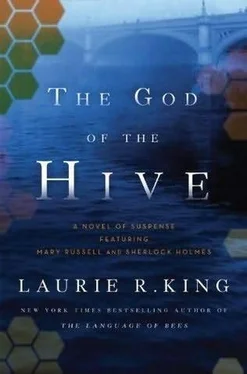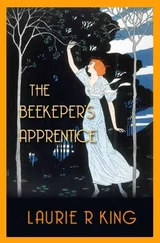“Surely he must at least suspect that you’re alive and Gunderson is dead?” I asked Mycroft. “Gunderson has been missing for five days, and you said yourself that evidence at the warehouse testifies to things having gone awry.”
“Short of digging up the grave, he can’t be certain that Gunderson didn’t deliver my corpse to the mortuary, then lose his nerve and flee. And without knowing what ‘precious object’ he possesses-or claims to possess-Sherlock and I decided it was best not to push our opponent too far. The last thing we want him to do is cut his losses and go invisible.”
“So you’ve changed your mind about going to the office this afternoon?”
“We have,” Holmes answered for his brother. “Russell, about your friend Goodman.”
“Yes, I’d have expected him to return before this.”
“He is a concern.”
“No,” I said flatly. I could tell from his tone what he was suggesting, and I would have none of it. “Robert Goodman would not give us away.”
“How can you know that?”
I turned my face to him. “Because you are Estelle Adler’s grandfather. There is some tie between those two, I can’t begin to explain it. But he would do nothing that would make her lot any worse. Nothing.”
“Then where is he?”
“I don’t know. Maybe he’s gone to see her.” It was a spur of the moment suggestion, but once it had come to mind, I had to say that it would be very like him, to turn his back on matters of monumental political import to go and play tea-party with Estelle. Had I mentioned Tunbridge Wells in his hearing? I might easily have done.
“Well, if he does return in time, how do you suggest we deploy the man? He is quite effective at the head of a marching band, but would he be of use in a tight place?”
“He would stand up for us, yes. But if you’re asking, would he use a gun?” I thought about the contents of the envelope Javitz had given me. In the end, I had to say, “I shouldn’t want to ask him. And I really wouldn’t want my life to depend on it.”
We had little more than twelve hours to assemble a foolproof plan to save a life, and an empire. We resolutely turned our minds to the maps and drawings Holmes retrieved from Mycroft’s study downstairs, doing our best to ignore hunger, mistrust, and anxiety.
At four o’clock, I left the building to seek out another telephone. The powerful sense of release brought by hearing Javitz’s voice coming down the line was only somewhat countered by Estelle’s querulous demands that I produce Mr Robert. I assured her-several times-that I was doing the best I could, then distracted her with a question about how Dolly had enjoyed her visit to the sea-shore, and eventually convinced her to return Javitz to the conversation.
“This should be over tomorrow,” I told him. One way or the other.
“It would help if you could get Goodman to ring here,” he said, although I was relieved to hear him sounding resigned rather than desperate.
“I’ve, well, I don’t know where he is. In fact,” I hurried to say, “he may turn up down there. If he does, make sure you don’t let him talk you into coming back to Town before I’ve spoken with you.”
When I had rung off from Tunbridge Wells, it was time to try Holland again. This time, I was at the phone for nearly two hours, achieving two actual if short-lived connexions. A man came onto the line, and we quickly located a common language in French. Our first conversation, which lasted approximately forty-five seconds, determined that “Daniel de Fontaine” and his nurse were still registered at the hotel, although he wasn’t entirely certain where the two were at this time. However, they had placed a series of telephone calls to England for which he very much hoped M de Fontaine’s friends would guarantee payment since-
And we were cut off. I fear I shouted at the exchange operator, which never helps one’s cause, but eventually I was again speaking with the Dutch hotelier. I began by hastily assuring him that all his costs would be reimbursed, and more, by the young gentleman’s generous friends, but that I had to know where he was.
And at that, we reached an impasse. The man wasted a couple of minutes with a delicate description of how unfortunately short of funds these two guests appeared to be running, and was only slowly reassured by my increasingly desperate assertions that money was no problem. Finally, he permitted himself to be steered back into the matter at hand, namely, that the young gentleman had gone out walking on the Sunday afternoon-the two of them often went out walking, M de Fontaine seemed a great lover of the open air, although on this occasion the lady appeared to have chosen-
“Please!” I shouted. “Where is he?”
Taken aback, the hotelier admitted he was not certain. The lady had come down in the afternoon and enquired as to her companion’s whereabouts, and became increasingly agitated when the hotel was unable to produce him. Although a handsome young man like that, perhaps he was not taken with a woman with hair that colour-and the temper! Ooh la la! Such a temper, it would be entirely understandable if he were to have chosen to go elsewhere for a day or two. And truth to tell, the hotel staff was keeping a close eye on the possessions in those two rooms, since it was not unheard-of for guests to lay a false trail and quietly slip away, leaving their bills unpaid…
“I will pay the cost. Do not throw them out. Permit them whatever it takes to make them comfortable.”
Why a voice over the telephone should be considered a substantial guarantee I could not think, but the man seemed reassured. However, that was about all he had to tell me. The red-haired woman had stayed the previous night, but she had left the hotel early and not been seen in the hours since. Yes, he would make her welcome-and M de Fontaine, as well-whenever they returned. Yes, he would tell them that I would telephone again tomorrow, and that they were to stay at the hotel until they heard from me.
I put up the earpiece; dread lay heavy in my bones.
I made one last telephone call, to Billy’s home number. As I had hoped, he answered, sounding belligerent. I spoke five clear words and rang off.
Back in the Melas flat, Goodman was still missing. Holmes listened to my news with no expression on his face, but when I attempted to reassure him that perhaps Damian had merely needed some time to himself, he waved away the possibility with a sharp gesture.
“Mycroft’s telephone rang, from Saturday until Sunday and not since then. The local exchange would know where those calls were coming from.”
Neither Mycroft nor I argued with him. In any case, we would know before long just who the “object of affection” was.
Mycroft set about producing a supper of remarkably heavy scones (lacking butter, they more closely resembled the flat breads eaten by the Bedouin), saving the eggs for a last meal before we left.
The prime question was, how far could we trust Lestrade? I felt he would come down on our side in a pinch; Holmes suspected he might come down on our heads. Mycroft cast the deciding vote, for compromise: We would telephone to Lestrade at home, letting him know that we badly needed a police sharpshooter, but we would wait to tell when and where to appear. We could not risk an all-out police presence, with roadblocks and desperate shooting, so we would keep him in the dark until the last moment.
One had to feel sorry for Lestrade’s wife: He was not going to be sanguine about the arrangement.
Westminster Bridge crosses the Thames on its northward turn, with the Victoria Embankment meeting the Houses of Parliament on the west and the County Hall, St Thomas’ Hospital, and Lambeth Palace gathering on the east bank. It was a sixty-two-year-old iron bridge some 1200 feet long and 85 wide, with generous footways and a pair of decorative street-lamps atop each of its seven piers. There was seldom a time when the entire length of it was deserted, but half past two in the morning would find it as empty as it got.
Читать дальше












